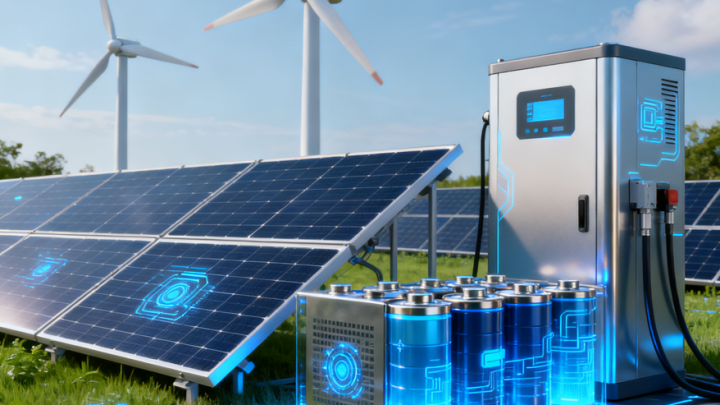Focusing on Artificial Intelligence, Advanced Manufacturing, New Energy and Other Fields: "CIIE Voices" Reveal New Trends in Technological Development
Date:2025-11-12

The 8th China International Import Expo (CIIE) was held in Shanghai from November 5 to 10. Journalists learned from interviews that this event serves not only as a platform for the exchange of commodities and technologies, but also as a frontier for the collision of top - tier global wisdom. Top scientists, industrial leaders and representatives of international organizations from around the world put forward a series of forward - looking viewpoints focusing on key fields such as Artificial Intelligence (AI), advanced manufacturing and new energy. These "CIIE Voices" go beyond mere technological demonstrations and reveal the new trends of scientific and technological development amid the complex international landscape.
Artificial Intelligence: From Model Breakthroughs to Technological Integration
After the era of large language models, where will the future breakthroughs in artificial intelligence lie?
"The ultimate goal of artificial intelligence is to enable human - level intelligent machines to understand the world and act according to goals. At present, we only have the 'building blocks' for constructing intelligent systems, but lack the principles and technologies to establish complex intelligent systems," noted Joseph Sifakis, the 2007 Turing Award laureate. While acknowledging the breakthroughs achieved in large language models, he calmly pointed out that artificial intelligence is still in its "initial stage", and reliability constitutes the core challenge at present.
He holds that China is well - positioned to take the lead in the field of industrial artificial intelligence. It should put forward a vision different from that of the United States, and leverage its own advantages in industrial foundation and data to develop basic components and specific technologies.
Zhang Jianwei, a foreign academician of the Chinese Academy of Engineering and a professor at the University of Hamburg in Germany, emphasized the enormous potential of technological integration. He opined that in the future, disruptive technologies such as artificial intelligence, robotics, Augmented Reality (AR)/Virtual Reality (VR), new energy and new communication technologies will lay a solid foundation for innovation.
Looking ahead to the evolution of artificial intelligence, Wang Xingxing, founder and CEO of Yushu Technology, stated that current AI training relies heavily on massive external data inputs. However, true intelligence should be endowed with the capabilities of self - learning and self - programming, eliminating the need for manual data collection. "I firmly believe that with the continuous investment of funds and talents, the field of machine intelligence will undergo tremendous changes in the next three to five years, and I anticipate the emergence of generalist robotic models."
Advanced Manufacturing: From Cutting - edge Routes to Standard Setting
In the manufacturing sector, technological innovations—ranging from nano - level lithography technology to large - scale factory systems—are reshaping production paradigms.
Shen Bo, Global Executive Vice President and China President of ASML, a global leader in semiconductor lithography, stated that artificial intelligence acts as a crucial driving force behind the development of the entire semiconductor industry. Nevertheless, its advancement has also posed severe challenges related to computing power and energy consumption.
To address these challenges, the semiconductor industry is advancing along two major routes: continuously reducing transistor sizes through 2D scaling, and achieving chip stacking via 3D integration.
The establishment of intelligent manufacturing standards has also attracted widespread attention. Rudy Beriadi, Assistant Secretary - General of the Technical Committee on Industrial - process Measurement, Control and Automation of the International Electrotechnical Commission, pointed out that intelligent manufacturing represents the integration of multiple technologies. Against the backdrop of current interconnected technologies, systems have become borderless, making the international standardization of intelligent manufacturing technologies particularly critical.
This viewpoint echoes the stance of Xiao Song, Global Executive Vice President of Siemens and Chairman of Siemens China. Xiao noted that the integration of digital and real economies (i.e., the in-depth integration of digital technologies with the real economy) constitutes Siemens' core development strategy. Only when innovation is deeply integrated with industries can it generate maximum value.
Regarding intelligent manufacturing testing, Ma Yushan, academician of the Chinese Academy of Engineering, commented that testing serves as the "sensory system" that forms an effective closed - loop for intelligent manufacturing. For the future development of this field, he suggested enhancing top - level design, promoting the integration of industry, academia and research, fostering professional talents, establishing testing standards, and increasing investment in basic software.
New Energy: From Energy Storage Technologies to Open Cooperation
Energy transition stands as a core issue in realizing sustainable development, with energy storage technologies playing a pivotal role. Stanley Whittingham, winner of the 2019 Nobel Prize in Chemistry and professor at Binghamton University, State University of New York, argued that lithium - ion battery systems will continue to dominate the market in the next five to ten years, thanks to their advantages in scale and cost. Battery manufacturers must adopt a holistic perspective of the entire battery ecosystem, trace raw material extraction, reduce the use of toxic substances, and strengthen the systematic management and recycling of battery manufacturing materials.
Zhao Tianshou, academician of the Chinese Academy of Sciences and Director of the Institute of Carbon Neutrality and Energy at Southern University of Science and Technology, attributed the slower - than - expected progress of energy transition to the uncontrollable nature of new energy sources, emphasizing the need for long - duration and high - safety energy storage technologies. As an emerging energy storage technology, flow batteries possess inherent safety, flexible duration, easy capacity expansion, long cycle life, and broad application scenarios. They are deemed key to breaking the bottleneck in long - duration energy storage technologies in the future.
From the application perspective, Li Keqiang, academician of the Chinese Academy of Engineering and professor at the School of Vehicle and Mobility of Tsinghua University, indicated that the new energy vehicle industry is currently in a period of transformation. As its scale keeps expanding, the "three - electric system"—centered on batteries, motors, and electronic control systems—is restructuring the automotive industry ecosystem and spurring new opportunities.
From rational prospects for artificial intelligence, to precise collaboration in advanced manufacturing, and exploration of pathways in energy technologies, the intellectual exchanges at the 8th China International Import Expo demonstrate that the wave of technological innovation and the consensus on open cooperation are jointly driving the future industrial development. Faced with both opportunities and challenges, China is adopting a more open stance to gather global wisdom, playing a key role in advancing scientific and technological progress and building a sustainable future.
Source: Economic Information Daily
